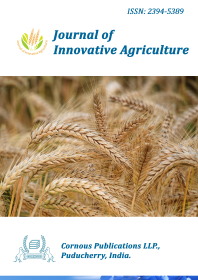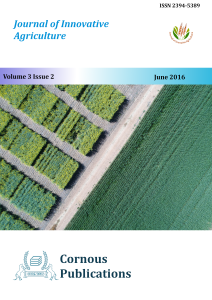
Journal of Innovative Agriculture
Peer Reviewed Open Access Journal
ISSN: 2394-5389 NAAS Rate: 4.05
Submit Manuscript
Peer Reviewed Open Access Journal
ISSN: 2394-5389 NAAS Rate: 4.05
Submit ManuscriptBlack gram (Urd bean) is an important pulse crop preferred in South India due to its daily dietary component. Often the productivity is limited by environmental stresses particularly of water, salinity and high temperature. Transitory or constantly high temperatures cause an array of morpho-anatomical, physiological and biochemical changes in plants, which affects the plant growth and development and may lead to a drastic reduction in economic yield. The adverse effects of heat stress can be mitigated by developing crop plants with improved thermo tolerance using various genetic approaches. A thorough understanding of physiological responses of plants to high temperature, mechanisms of heat tolerance and possible strategies for improving crop thermo tolerance is imperative. The sugar metabolism is an important parameter and understanding the thermo tolerance in terms of total carbohydrate and starch content might through light on genotypic variability. Among the nineteen black gram genotypes screened under controlled atmospheric studies have shown that VBG – 06 – 002 has shown promising for heat tolerance as the carbohydrate content in leaves and starch content in the grains was least affected by heat stress and deserve to be evaluated further. There were only 2.8 and 5.07 per cent reduction in the carbohydrate and starch content due to heat stress when compared other genotypes which have recorded more reduction in both parameters indicating genotypic superiority for heat stress. Based on the biochemical analysis, black gram genotype.
High temperature, Black gram, Total Carbohydrates, Starch
Dash, M and Darashree. 2012. Temperature effect on morpho-biochemical characters in some Blackgram (Vigna mungo) genotypes, ISRN Biotechnology, pp. 1-20.
FAOSTAT. 2012. http://faostat.fao.org/site (accessed on 18 March 2014).
Hasanuzzaman, M., Nahar, K., Alam, M. M., Roychowdhury, R., and Fujita, M. 2013. Physiological, biochemical and molecular mechanisms of heat stress tolerance in plants. International journal of molecular sciences, 14(5): 9643-84.
Hedge, J.E. and Hofreiter, B.T. 1962. In: Carbohydrate Chemistry, 17 (Eds. Whistler R.L. and Be Miller, J.N.), Academic Press, New York.
H. R. Lerner, “Introduction to the response of plants to environmental stresses,”in Plant responses to Environmental Stresses, pp. 1–26, CRC Press, 1st edition, 1999.
IIPR Vision 2030. 2011. Printed & Published by the Director, Indian Institute of Pulses Research (ICAR), Kanpur-208024.
IPCC (Intergovernmental Panel on Climate Change). 2007. Climate change and its impacts in the near and long term under different scenarios. 2007: Synthesis Report (Eds The Core Writing Team, R. K. Pachauri & A. Reisinger), Geneva, Switzerland: IPCC. p. 43–54.
Jukanti AK, Gaur PM, Gowda CLL and Chibbar RN. 2012. Nutritional quality and health benefits of chickpea (Cicer arietinum L.): a review. British Journal of Nutrition, 108: S11-S26.
Scott, T. A. and Melvin, E. H. 1956.Anthrone Colorimetric Method. In:“Methods in Carbohydrate Chemistry”,(Eds.): Whistler, R. L. and Walfrom, M. L..Academic Press, New York, London, 1: 384.
Vijayaraghavan H., M.Pandiyan, S.Vincent and C.N.Chandrasekhar. 2013. Impact of High Temperature Stress on Growth and Yield of Vigna mungo Genotypes. Proc. National Conference of Plant Physiology-2013 on “Current Trends in Plant Biology Research” Directorate of Groundnut Research, Junagadh 13-16, Dec. 2013. Pp.284.
Wei, k. S., Yang, W. L., Jilani, G., Zhou, W. J., Liu, G. K., Cheng, F. M. 2012. Effect of high temperature on the enzymatic activities and transcriptional expression of starch debranching enzyme (dbe) multiple isoforms in developing rice endosperms. The Journal of Animal & Plant Sciences 22(1): 97-107.
Yude C, Kaiwei H, Fuji L, Jie Y. 1993. The potential and utilization prospects of kinds of wood fodder resources in Yunnan. Forestry Research 6: 346-350.
